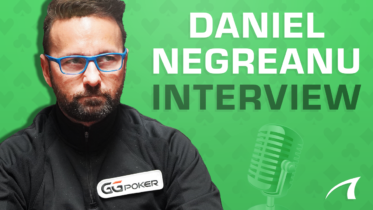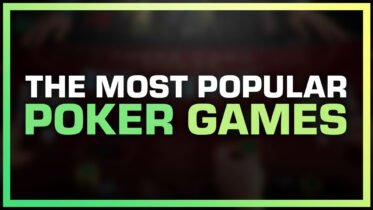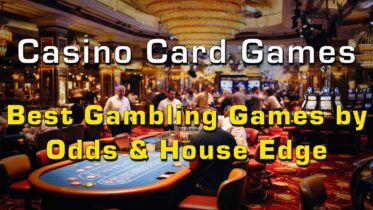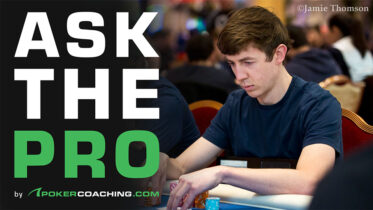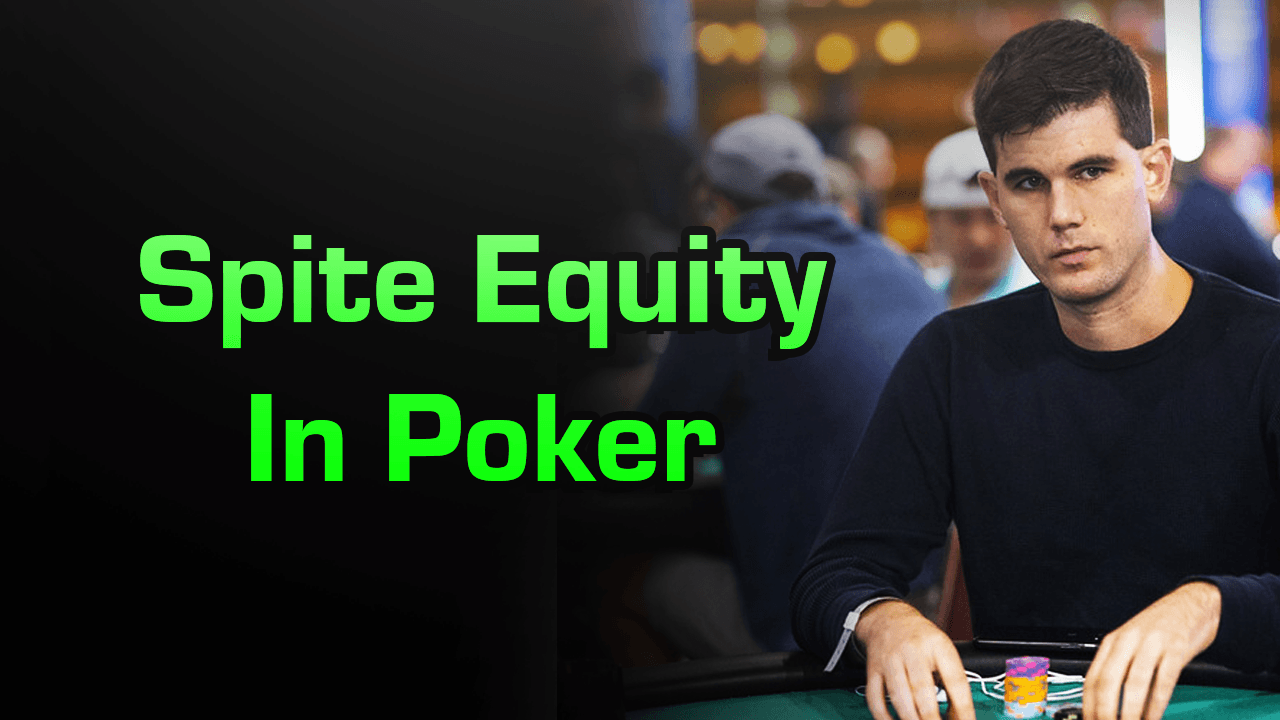A long-time fan of the Jonathan Little YouTube channel, six-time WSOP bracelet winner and Poker Hall of Fame inductee Daniel Negreanu was kind enough let me interview him as we discussed a wide array of topics relating to poker. While we shared plenty of advice for aspiring poker players, we also discussed the 2023 WSOP, his illustrious poker career, and times we have faced eachother at the poker table. If you are a fan of Kid Poker, you will want to check out the full interview below!
- Daniel Negreanu's Insane 2023 WSOP Schedule
- What Motivates Daniel Negreanu?
- Advice For First-Time WSOP Players
- How Daniel Negreanu Won His First WSOP Bracelet
- How Has Daniel Negreanu Remained One Of Poker's Best?
- The Drama Of The Poker Industry
- GGPoker and Studying Different Poker Games
- Playing Poker Against Michael Addamo
- Daniel Negreanu On Fixing Leaks In His Poker Game
- Interview Speed Round With Daniel Negreanu
Daniel Negreanu’s Insane 2023 WSOP Schedule
JL: The World Series of Poker of poker is here and you said that you plan to try to play 88 out of the 115 events. Why? Why are you crazy?
DN: Well here’s the thing, when I make my schedule I put out potential events that I may play, right? Now, if I were to play all those events it would be the worst World Series in the history of poker, because it assumes that I never make a day two or have any success through seven weeks. So those are just ones where say for example I’m in the $10,000 Razz, I bust, and there’s a $1,500 PLO. I might play that. Because we sell pieces at PokerStake.com, I like to include all the events possible, and then when I sell the pieces the ones that I don’t play people get refunded.
JL: I try to have a piece of your action every single year. Daniel Negreanu action at no markup in the World Series of Poker is probably a good deal! What possesses you to sell a decent amount of your action at no markup?
DN: Well first and foremost: I don’t need the money. I always looked at markup and I totally understand why people do it and need to do it, but for someone in my position, it felt like nickel and diming. The purpose of me doing it wasn’t to make money off of poker fans. I thought of it when I started doing the vlogs in 2017. I think of sports, and how if you watch a team that’s 1-7 and another one that’s 2-8, is that a fun game to watch? Well no, but it is when you have a little bit of money on it right? So I thought by creating the vlogs daily and giving people a chance, they can live vicariously through it. Financially it didn’t make much of a difference to me. Yeah, I am giving up money and equity, but last year people bought into the World Series and it didn’t go so well.
JL: Last year I think you lost $1,100,000, a whole pile!
DN: Luckily for those that still had faith, in the Super High Roller Bowl I did sell a piece of that and I cashed for $3,300,000 million, so I was able to recoup for those people, but obviously not the World Series people. I haven’t had a loss that big, and it really comes down to: you play the $250k once or twice, you play the high rollers, and if you don’t do well in those a million isn’t very much.
JL: So funny enough, you had a bad World Series and then you won a big tournament. I’ve actually done that before as well, I had a terrible World Series and I won WPT like right after! I think a lot of people who have not gone through crazy swings in poker struggle with showing up and playing sane every day when things are going horribly wrong. Explain how that feels when you do show up and you just kind of get crapped on and you have to show up the next day. What keeps you motivated to show up and play your best? You don’t need the money, so why do you do it?
What Motivates Daniel Negreanu?
DN: I was talking to Eric Wasserson about that, and he thinks I love the pain. I don’t know if I agree with that, but it’s a theory that could hold some weight. I’m human, I live my emotions and I experience them in the moment, I’m fine with that. But I went through about a two-week period at the World Series where I didn’t win any all-ins. I was so frustrated because how am I supposed to win if I lose every time I go all-in? It wasn’t like I was going all-in with the worst hand, I had the best of it almost every time. I’ve always been very resilient, very self-motivated, and I put a lot of pressure on myself. I do love it and I enjoy the grind of getting back out there and giving it a go. I have a little bit of a checklist, if I’m losing I ask myself: am I getting it in bad pre-flop? Am I bluffing it off too much? Am I calling it off too much? Am I getting so short that I’m not really picking up spots and not having big stacks? Things like that. If the answer to all those questions is no, then I’m going to hang in there and have some faith. That’s how I gauge after all these years of experience, it’s independent of results.
JL: So imagine you are going through that checklist and you do see that you did something wrong in your mind after the fact. Now to be fair, maybe you’re supposed to call off with a second nuts and the guy has the nuts and you lose, that happens. But what happens if you think you played poorly? What do you do to show back up ready to play the next day? A lot of people get really down when they screw up, because they realize they’re going to get unlucky sometimes, that happens, but you don’t necessarily have to play poorly.
DN: Whenever I have some sort of a breakdown or a hole or a leak, I’m like “Aha! They’re just not paying me off ever. Nobody’s calling me, so it must mean I’m not bluffing enough. There are spots here that I’m not taking, I need to start taking those.” I’ll always be introspective and think about new ways, new lines, new approaches, and different things I can do because I’ve always been more of an exploitative mind. I did study Game Theory and relatively high-level heads-up, but I’ve understood that my skill level or my edge has always been understanding how people perceive me and then finding ways to exploit. Whenever I notice things are not going well, it’s an opportunity for me to go “okay, what can I open up here and what can I do differently that maybe I wasn’t thinking about in the moment?”
JL: I think a lot of people who succeed at a high level realize “I am losing for some reason. I made this mistake, I lost for this reason and I need to figure out how to take advantage of it in the future.” If you are blinding down and you’re folding too often, well you’re probably getting bluffed too often. Or the opposite if you’re always calling off and losing you’re probably a calling station.
DN: It’s funny you mentioned calling station. There was a hand against you where I was really disappointed in myself. I made a big mistake by letting you win a pot because I went through it and I had a natural bluff. I had 10-9 of spades and the board was A-K-Q-8-8, and there were two spades on the turn, and even the eight was not a spade so I blocked 9-8 suited. I bet turn, you checked the river, and I went through in my head when you called turn like “I think Jonathan might be a little bit stationy in this spot”, so I elected to not go with the GTO approved move and I checked it back. You would have folded it for sure, it was A-Q and you had Q-10 you could never call! I was really disappointed, and that’s an example where I ended up busting that tournament later getting it in, but that was a key pot that I’m supposed to win but made a miscalculation.
JL: It’s a tough thing though, because I could have just had a hand I’m not folding right?
DN: The thing is I don’t play with you enough. I’m not totally sure how you perceive me in terms of my bluffing. So if I had you pegged as somebody who thinks “Daniel never bluffs”, I’m never checking. But I was thinking you might have watched some of my videos, you’ve seen enough of the moves if you will, that if you had an ace specifically you might call. But I remember specifically in that situation, essentially your range was capped. You raised the cutoff, I three-bet the button, you just called and it was like K-Q-8. Check-check. Turn the ace, check, I bet third pot. River an eight, you checked and I just had 10-9 of spades and was like… check. It was so stupid! What I really should have done there was put you to the test. Even if you do have an ace, I should have made an overbet.
JL: You’re gonna put me in a bad spot. I don’t have very many trips, you will have some, and maybe you have a straight sometimes.
DN: Like I said I had the nine of spades and blocked 9-8 suited. You didn’t four-bet me so I can mostly rule out aces, kings, and queens. It’s gonna be a tough call for you but I chickened out.
JL: Well you just got to play better next time you know? You can’t play great all the time!
DN: Next time I’m just gonna bluff you like crazy!
JL: If you’ve watched this channel you know that I am a bit of a calling station. I do not like folding, but I would have folded the Q-10 there.
DN: See that’s what I’m saying! I was right about that!
Advice For First-Time WSOP Players
JL: So a lot of people are going to the World Series of Poker for the first time, and they are gonna make all sorts of mistakes both at and away from the table. For people who are kind of good at poker, who watch this channel and are not total novices, what few pieces of advice would you give them?
DN: First and foremost: have fun! Really just soak it in. Understand that you’re probably gonna lose, it’s just true. If you only play three tournaments, the chances that you actually win money at the three tournaments are low, it’s the nature of the beast. So have fun with it when you get in there, just play your game and don’t be intimidated. Play the way you play. Don’t think all of a sudden you’re sitting next to Jonathan Little and have to change your game. Do what you do best, do what you know. A lot of people ask me what they should do differently, but it’s too late for that! Now, if you are someone who is going out there with a limited bankroll who does want to do this professionally, you have to monitor yourself in a very different way. You have to be much more mindful of your bankroll and the stakes that you’re playing. Make sure that you’re finding yourself in tournaments that are really good value.
Maybe play some satellites or some events at different properties that are smaller and things like that. Really sort of map it out. I would suggest this if you are going to go for a week or two, map it out now! You don’t have to stick to it, but have an idea of what every day is going to look like for you roughly, so that way you don’t wake up in the morning going “oh no! Where do I go? Where do I play?’” Map it out and really sort of think about how you want to approach it.
JL: You mentioned how you need to prepare ahead of time, study ahead of time, and get good at poker before you go, because once you’re there there’s not a whole lot you can do beyond show-up play ready to play and then play your best.
DN: During play isn’t the time to learn, that’s not the time to try things out. Go with what you got. When the series is over you can look back at some areas you can improve upon and “get in the lab” if you will. You study and give it your best shot next year.
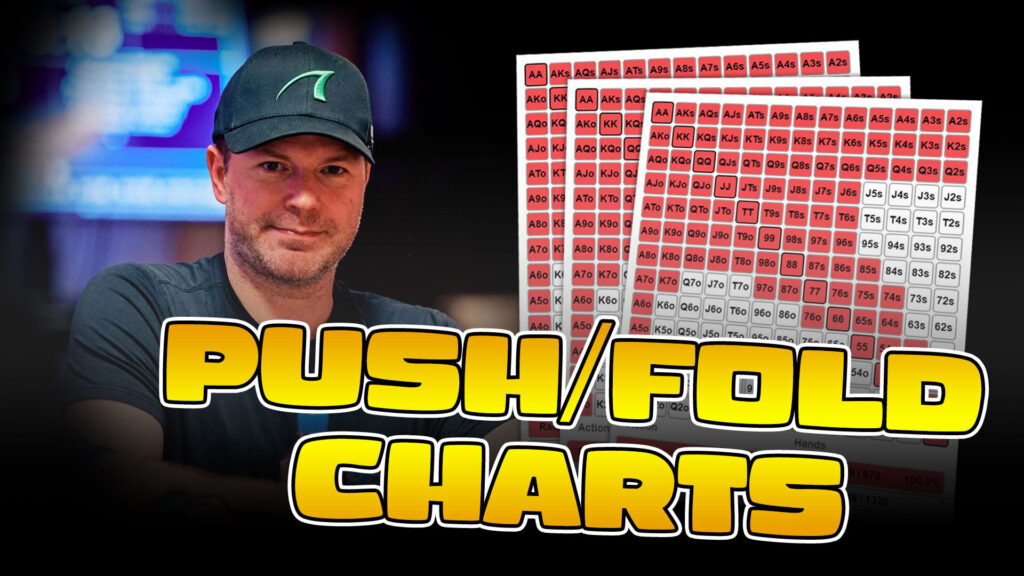
Make the best preflop decisions with Jonathan Little’s Push/Fold Charts!
How Daniel Negreanu Won His First WSOP Bracelet
JL: Your first cash in the World Series was back in 1998 in a $2,000 Pot Limit Hold’em tournament and you won it. What was the World Series of Poker like back then and how was that experience of winning the first tournament you cashed?
DN: I first went out there in 96 and played satellites the year Huck Seed won. Couldn’t get into the Main. It still pains to me to this day, there was 11 seats given away and I came in 13th going broke with aces. When you’re only 21 or 22, that one stings.
JL: And you remember it forever!
DN: Of course. Then you I went back in 97 and still wasn’t able to afford it. Back then the smallest tournament was a $2K, there was no $300 Gladiator type stuff. What we did if you wanted to be part of the World Series experience was you played the super satellites for the Main or you played the one tables to try to get into events. I was on a short bankroll playing $10/$20 $20/$40 Limit Hold’em and I found myself three-handed in the satellite with Todd Brunson and Mike Matusow in a game I’d never played before: Pot Limit Hold’em.
We get heads-up and Todd says “ do you want to save $500?” I say sure. I beat him, I got lucky I had K-J and beat his K-Q. He threw me the $500 and said “I’ll take a piece of you tomorrow.” Well, I wasn’t gonna play because I had $2800 to my name, but Todd Brunson said he had enough faith in my game and he thinks I should play, so of course I jumped in the event. I remember just making the money thinking “wow, this is cool”. Then making the final two tables, winning a flip, making the final table and it was all sort of like surreal. At the time I was the youngest player to ever win a World Series of Poker bracelet and I was 1-0, and I thought “wow I’m just gonna win like a couple bracelets every year and have a hundred by the time I’m 40.” Didn’t work out that way!
JL: You mentioned you had $2,800 to your name, but you also mentioned you had won three tournaments previously. Where did all your money go!?
DN: Good question! So, I went to LA with $30,000. I’d win a tournament or I’d win in the cash games, but somehow I only had $15 000 left! I made bad decisions in trusting people and staking people back then, was kind of an easy mark. There were a lot of “Hustlers” back in the day who I would stake in cash or tournaments. I was making bad decisions with the money that I was making, but I don’t regret. I learned my lesson, but that’s where the money went! Helping everybody.
JL: A lot of poker players go through this where they lend money or buy people’s action, it goes fine in the beginning, but then they’re stuck, they’re stuck for a long time. If it goes poorly right off the bat, they’re just kind of done with it. One time, I taught a guy to play poker a long time ago when I was 18. I bought him a computer, I gave him a thousand dollars to play online, and then he promptly moved five states away and never talked to me again. So I got robbed right off the bat!
DN: Here’s the thing, I grew up in a different time before online poker. I was very new to the scene, was traveling by myself and making friends. I was obviously an up-and-comer and other people saw me who needed money. So they’re like “let me be nice to that kid and see if I can get staked.”
JL: It’s a tough thing. If you never need to get a loan or get a stake, you in turn don’t really need to give the loans and stakes. But at the same time, maybe you’re traveling and you don’t have a ton of money, or maybe you’re pushing to try and grow your bankroll as fast as possible. You’re gonna lose sometimes, maybe you need the stakes. It’s almost like part of the deal to some extent.
DN: It is. In the world that I live in at the high stakes, if you’re traveling to different locations you may need $50,000 for a buy-in. At those stakes, it’s much easier to pay that debt immediately, because most people deal in crypto to some degree. So if someone needs $50k cash, they’ll send you a couple Bitcoin or whatever.
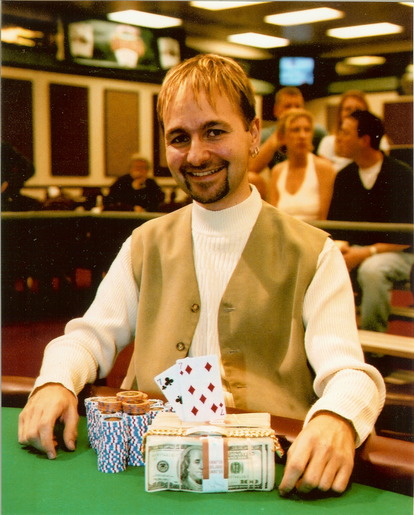
Since winning his first career WSOP bracelet in 1998, Daniel Negreanu has never looked back,
having won six total over the course of his career.
How Has Daniel Negreanu Remained One Of Poker’s Best?
JL: The world has changed a lot, that was not a thing back then. Poker has changed a ton, and a lot of players from 1998 are no longer in the poker space today. Presumably they ran out of money or something else, but you’re still here and you are still at the top! What I want to know and what everybody wants to know is: what makes you special and unique to the point that you have found a way to consistently stay at the top?
DN: Number one is I love it, I just love it! I always look forward to the World Series, I twiddle my thumbs and I can’t wait. Number two, and people are gonna go like “you!?” when they hear me say this, is self-awareness and humility. I know that sounds crazy for someone in my shoes to say, but it’s true in the sense that I always have a healthy respect for the younger generation and my peers. When I was young and an up-and-comer, I remember the Tom McEvoy’s and the Brad Daugherty’s would scoff at me saying, “this aggressive kid, he’s gonna go broke!” I don’t do that. I look at Michael Addamo, who is the latest of the kind of new age, unique players. I always want to know and understand what they are doing.
I hired people to help me learn how to use solvers and understand Game Theory. I’ve always been introspective to know where my game’s at and what areas to improve. One of the ways to do that is to learn things from others. I think it’s a deadly combination when you take someone like me, who has 30 years of experience playing this game exploitatively, and then teaching him the theory behind all this stuff. What I do is I essentially try to understand the theory, and figure out how people misapply it. I think the dangerous thing people do is they see what a solve says and go “oh! That’s the right play!”. But is it? Is there anything deeper that you can look to? Sometimes when you make the correct “theoretical” play, it’s the absolute punt of all punts.
JL: Especially in a tournament, right?
DN: No question. For example, you’re playing in a tournament and you know at 10 big blinds if somebody shoves the small blind, the range you’re supposed to call with is pretty wide. That’s true, but if you just did that and didn’t factor in the player who went all-in in the small blind is the biggest knit of all time, and decide king-six offsuit is a defend, it’s really not against this player! You have to learn to adjust your calling ranges against players.
JL: Also in a tournament, you just want to survive. Imagine king-six is the worst hand you’re supposed to call with on a GTO calling chart, but you know with two-thirds of the field gone you should be folding. There’s value just hanging out. I think a lot of people misapply going for thin value bets on the river, going for big hero calls and big bluffs on the river because they’re usually barely profitable. If it’s barely profitable, it’s not worth taking a risk for a bunch of your chips.
DN: You bring up a really important point that I discussed in a video recently, I think a lot of people don’t understand this. A lot of people study pre-flop and flop, because those are the easiest streets, it gets more complex on the turn and river. People will look at the flop and they’ll be like “all right, against a quarter pot c-bet I should defend with A-10 on Q-9-4, because it’s worth .06 of a big blind.” Here’s the thing: it’s worth point 0.06 of a big blind to a solver because the solver will play the turn and the river perfectly. You will not. So the question is: is this a compounding error? Just because it says for the solver it’s +EV, it doesn’t mean it’s +EV for you if you’re not going to be able to navigate the turn and the river optimally. Most people won’t, so I will sometimes make folds on the flop that I know are solver approved calls, because I don’t want to find myself in difficult spots where I might go broke.
JL: I think a lot of people get it in their heads that they are better at poker than they actually are. They think their opponents are worse at poker then they actually are a lot of the time. It leads to them in that spot thinking “I can call because they are going to play worse than the solver”, without realizing that they are going to play worse than the solver too. It gets them in trouble! But going back to the way you were thinking about improving your skills, you realize that you are not a 100% perfect poker player. You’re obviously one of the best in the world, maybe the best in the world, but there’s still a lot of room for improvement even for you.
DN: Exactly. It’s the moment you stop thinking that you need to improve that you get surpassed. Ted Forrest used to say to me “most people compare their A-game to everybody’s F-game.” You see a guy play a hand terribly, say “oh my god did you see that call Jonathan made? How bad was that?” and then they have this whole idea about how that encompasses all of who you are and how you play, which is a huge mistake that you can use to exploit other people.
JL: It’s especially true if you see me hero call with that Q-10 from earlier. You may think I’m the biggest calling station in the world, but maybe that was one in a million.
DN: Perfect example, if I would have bluffed there for a pot-sized bet and you called with Q-10. The first thought that’s going to go in my head is “never ever bluff Jonathan ever again in a million years. Don’t do it!”
JL: Some people take that concept to the extreme and they’ll make poor decisions with the idea “I’m gonna make a poor decision now so my opponent now thinks that I’m a super duper calling station, and I can just fold every time they bet the river.” But I’m not so sure that necessarily applies. You might see that, but I don’t know how long it’s gonna stick in your head. I don’t know how long you’re gonna remember it, and are we even have a spot like that in the future for me to take advantage of it? A lot of people make these advertising plays, especially in casual home games, thinking they’re gonna capitalize, but I’m not sure that’s the case. What do you think?
DN: You bring up a good point, because essentially what you’re doing is creating a psychological leveling war. It’s like “oh my God, he just showed a really big bluff!” or “he called me really light, is he going to continue to do that?” Essentially, it doesn’t make it any easier necessarily when you’re playing against thinking players. I do think there’s value against some weaker recreationals, creating an image that you can later exploit, but at the higher levels you often end up leveling yourself into making mistakes.
JL: I view you as one of the best “leveling” people and best table talking people, yet here you are saying that you have to be careful against good people! Who knows what they’re doing? That’s something a lot of people don’t realize, they think they know what their opponents are doing but very often they just don’t. The other day in the heads-up match you got leveled kind of nicely, remember that with the J-10?
DN: Oh he leveled me a bunch of times!
JL: Eric Persson somehow leveled you a ton, it didn’t help him though he still lost.
DN: He table talks a lot too. Some of the things he says, if you look at past video, you will know “when he says this, he has it”, and he was doing the same thing when he didn’t have it. He’s conscious of what he’s doing and what he’s giving off. I think if you are going to enter that world of psychological warfare, you have to be very cognizant of the things you’ve done in the past. I’ll give you a perfect example: Martin Zamani got me so good in the PLO tournament at PokerGo Studios. It was a hand where I was bluffing the river, the board came queen-high, turn was an ace or a king, river was an ace, and I bet river representing J-10. He tanked for almost two minutes. He looked over at me and he said “you got to give me something.” I said “what do you have, like A-Q or something?” And he said “historically when you call people’s hands, that means you’re bluffing. I call!” I’m like “oh my God! He watches way too much video!” So I got totally owned because he did his homework.
JL: That makes me think the right situation against most people, especially the more casual, talkative players, is just sit there, be quiet and don’t say anything.
DN: No question. When I play against Phil Ivey you will not see me say anything, because he knows me so well. We go way back and it’s not like I’m ever going to be able to out talk him. All I’m going to be doing if I talk to Phil Ivey is tell him what I have.
JL: But then that extrapolates to Zamani and maybe Perssons, and who knows who else? That’s unfortunate because the table talk makes televised poker and playing poker a whole lot more fun. But now you are incentivized to not table talk so much.
DN: That was on me though, I take responsibility for that mistake. I didn’t know Martin Zamani well enough to know that he watches a lot of poker on TV. When someone watches a lot of poker on TV, a lot of my tricks they’re going to have seen. I have to be thoughtful of that and break up the pattern or don’t say anything in those spots.
JL: I always recommend that to people who are not world-class table talkers: just sit there and be quiet when you’re in a hand, you can talk when you’re not in a hand. They think they’re gonna be able to level their opponent even though they don’t even know the opponent. People think they know things that they do not know and it gets them in trouble, in all aspects of life!

Read one of the highest regarded articles on the PokerCoaching.com blog: The Bankroll Bible
The Drama Of The Poker Industry
Speaking of televised poker, you said a while back that televised poker should be more like professional wrestling and less like golf. Poker has definitely aired towards professional wrestling over the last few weeks, but where’s the line? What is acceptable at and away from the table? Whether it is legitimately malicious or whether it is purely to get attention and eyeballs on you, what is acceptable behavior today? In professional wrestling, anything goes!
DN: Here’s the thing, I think we dip way below the line.The banter, the back and forth, the rivalries are all good and well, but once you start to get to personal attacks on people’s character and throwing out words like “scammer” and “fraud”, I think we’ve devolved into something that’s become nasty. Any sort of ‘mob think” activity against one person like we saw with Matt Berkey when he played on (Poker After Dark) recently, it felt very “high school”.
If you look at Dan “Jungleman” Cates, he’s incorporating WWE stuff, but that’s because he’s wearing a costume and playing a character. He’s like “oh yeah I’m Macho Man Randy Savage” and he embraces it. It’s fun and Jungle’s just being Jungle. Ultimately what sells best is when people are being genuine and authentic to who they are. I get it, people playing in high roller tournaments are not there to entertain. They’re not there to be a circus clown, they’re there to win the money. But if you are on a made-for-tv event and you’re invited to it, I do think there’s some responsibility of adding to it and contributing by being entertaining in some way.
JL: It’s tough. I think a lot of people may be unaware of things they do that potentially offend other people. Nowadays on the internet you can offend anybody with anything. For example, yesterday you wore a big muscle suit when you played against Persson because Persson has big muscles, but what if somehow, some way, Persson was actually really ashamed and embarrassed of his muscles because they’re not big enough? Now you’re making fun of his muscles and now you’ve offended him. Imagine that happens, and now you got the bodybuilder community getting mad at you on the internet, and next thing you know you’re banned for wearing a muscle suit that was obviously a joke.
DN: That expands past poker and sort of into the world we’re living in, with an uber sensitivity to certain things and people being offended on others behalf. It makes me think of years ago on the NBC Heads-up. I played against Scotty Nguyen and I dressed like Scotty, I put a mullet on and did the chains and I can do a pretty good Scotty impersonation. Scotty loved it, he embraced it and we laughed while having beers. We’re good friends! People outside of that were letting me know how offensive that was to Scotty, but I’m like “uh, Scotty’s fine with it.”
Similar to the Eric Persson example, I knew he’s a good sport, so I knew I could bring out the big (middle finger) foam fingers to him because he did that to Phil Hellmuth and it was all in good fun and it was good natured. I think what we lose in our society now is intent. When I did that thing with Scotty, was there any sort of racial undertones or demeaning behavior? No, it’s all about having fun, and I think right now in our culture there’s a little bit of a hypersensitivity to looking for reasons to be offended, even when the party being poked fun at is laughing along with the joke.
JL: It’s a rough thing, because maybe the party being joke at is laughing along with it and is perfectly cool with it, but maybe people like that person or not for whatever reason. That’s where it’s tough because you can make people mad for all sorts of reasons. Some people don’t like me and I try to be nice to everybody!
DN: I know that people today don’t believe intent matters and I totally disagree with that ideology. For example, a 75 year old man from Texas goes to a restaurant and the waitress comes by. He says “oh hey honey you look lovely today, can I can I get some more sugar?” We know now that using the word “honey” and speaking to a woman in that way is considered somewhat offensive, but do you think his intent was demeaning? He was being kind in his way, so we have to be more understanding and accepting of how rapidly things are changing. We should always question people’s intent behind anything that they did.
JL: I just want us all to be adults and to love each other and get along. It’s not high school anymore!
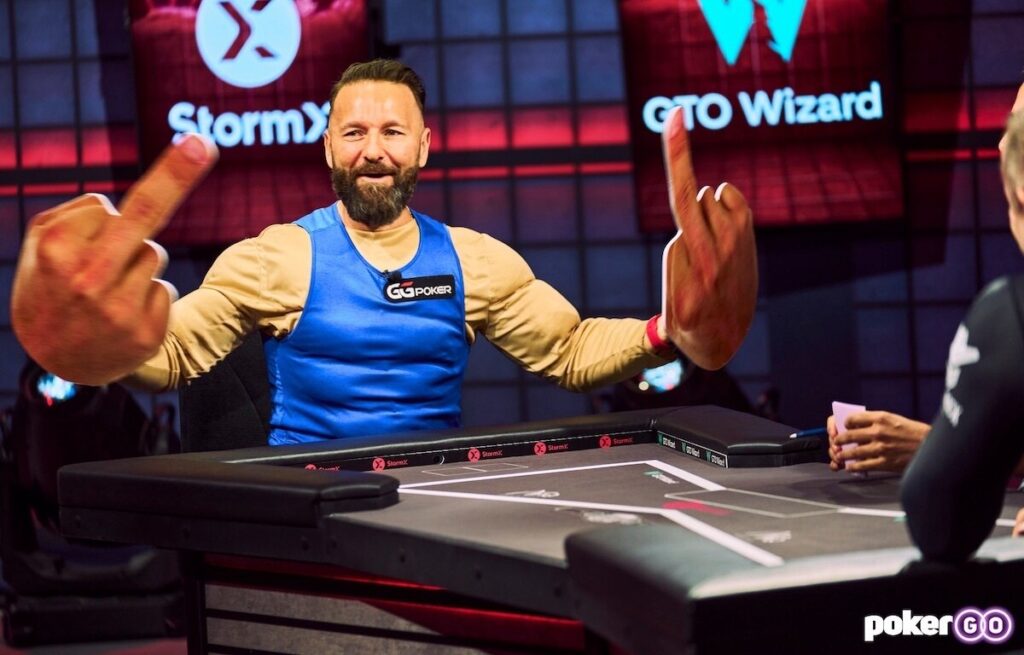
Negreanu brought out all of the accessories for his High Stakes Duel with Eric Persson (photo courtesy of PokerGO).
GGPoker and Studying Different Poker Games
JL: So you’re an ambassador for GGPoker, and every time I look at their site they have tons of traffic. Lots of big games, it’s good to see! Online poker might be in a rough spot though, due to all sorts of other things, like rake increases and people using real-time assistance. I want to know what your future predictions are for online poker.
DN: It’s very hard to say. I think online poker in one form or another is going to exist forever. People enjoy it and whatnot, but you bring up some important points, specifically about AI. What we end up having now is a cat and mouse game, with the operators trying to catch the cheaters and the cheaters trying to figure out how they’re trying to catch them and getting away with things. Anytime you’re talking about a game like poker or anything related to money, you’re always going to have people that are dishonest. They’re going to try to catch you. GGPoker is at the forefront of catching people. About a year and or two ago we banned between 60 and 150 accounts that we figured out were doing some things that were nefarious. As people get better and there is a fair balance where everyone has access to the same data and can see statistics on other opponents, I think that levels the playing field to a certain degree.
At the high stakes, games don’t run unless you’re able to bring in a player that others feel there’s value. If you look at high stakes poker, GGPoker is really the only place that has regular high-stakes poker, but why is that? GGPoker has the access and they have ways of bringing in “the fun players”, and then the pros play. You don’t see pro-on-pro/reg-on-reg action like we used to 5-10 years ago, that doesn’t exist. Those days I think are gone, because now people see no point in playing against a crusher and both players paying rake. We need somebody to support the game, and if they don’t exist then you don’t have a game. That’s true not only at high stakes but at all games, all games are created that way.
JL: Definitely. I’ve always liked the idea of sitting down and spending a lot of time learning a specific form of poker. Back when I was a kid, I would spend six months learning a new game like PLO or Stud, and just play it a ton. Those two games, as well as online cash games and heads-up, are really good for making you better at No-Limit Hold’em. I was wondering if you could give us a few things that you learned recently in the process of trying to improve your skills.
DN: You bring up a good point, specifically about heads-up poker, because here’s the thing: when you play heads-up, you’re filling your plate with a bunch of food, and it’s overloaded.
JL: Because ranges are super duper wide, right?
DN: Yeah. You’re on the flop thinking “okay this person could have Q-3 offsuit.” When you’re playing eight-handed, you don’t have to worry about under-the-gun having Q-3 offsuit. You can narrow the range down, which makes the calculations, counting the combinations and the value much easier. Essentially it’s as though you’re training your muscle by taking on something so much more complex, and then extrapolating how to play against even tighter ranges. It makes it a little bit easier. Learning how to play heads-up well at an elite level is far more complex in some ways than ring. Obviously, the one aspect of ring is you have multi-way pots, but overall being able to define hand ranges is so much easier eight-handed than when a guy’s opening button with 9-6 offsuit. I found by studying (heads-up) very hard, I was able to extrapolate a lot of what I learned to playing ring games and tournaments.
JL: We’ve seen historically how a lot of players who started playing heads-up and got to decently high levels have become very good full-ring and tournament players. They’re used to more difficult situations and playing much wider ranges, when you cut the range down by half it becomes simpler. I don’t think we’ve seen a whole lot of players go from playing mostly nine-handed poker to heads-up though, because it’s very difficult to do that. You’re used to playing 20% of hands, now you got to play 80%. It’s a big adjustment for someone who’s used to playing kind of good hands most of the time, to now having to play a lot of junk.
DN: To answer your question about one thing I learned from it: when you play eight or nine-handed by the river, ranges are pretty narrow and people usually have a pretty good hand. You don’t bluff as much, because you’re up against stronger ranges. When you’re heads-up, the one thing that was shocking to me is how often the computer wants you to bluff, it wants you to bluff a lot a lot more than most any human is comfortable with. You’re gonna be like “ are you kidding me? I have to go 3x pot here!?” When you go from ring game poker to heads-up, that’s one of the biggest eye-opening experiences. Understanding from a balanced perspective what it takes. When somebody bets the river, for you to call them they have to be bluffing at a decent clip, and if they’re not you can just fold every time. You can print EV if you don’t have the nuts.
JL: It’s interesting you mention the drastic overpots that you see happen heads-up, they happen way more than in most other forms of poker. I think that’s because a lot of heads-up players have studied the river more, they play more hands and they play wider ranges. They study the river more and they spot where you should be overpotting it on the river. That’s something you see a lot of really good online players doing, and also a lot of really good heads-up players doing that a lot of full-ring players do not do.
DN: It starts on the turn too. You see a lot of turnover bets in spots where you’re often up against capped ranges, allowing you to bet bigger. We mentioned this earlier, but the human brain will never be able to mimic a solver. Even with solvers, here’s the thing that’s important to know: you put in a small size, a big size, and an overbet, then you ask the computer “which of these three things would you do?”, and it gives you what it would do. But, optimally, the solver may choose something completely outside of that! Let’s say the biggest bet you gave it was 1.5 times pot, but you gave it 6x pot, maybe it chooses that right, but it’s impossible for us to put in every possible sizing range. The whole idea behind solver use is it gives us an idea of what the solver wants us to do. It wants us to make a small bet, a big bet, or an overbet, and we kind of have to extrapolate and humanize it. Understand: solvers aren’t limited, they can literally pull out any size out of their butt.
JL: What I typically do is run the spot using some more common sizes, and if I see the solver use mostly the big bets then I rerun it with more bigger bets. Sometimes it uses huge bets and that’s a lot of fun!
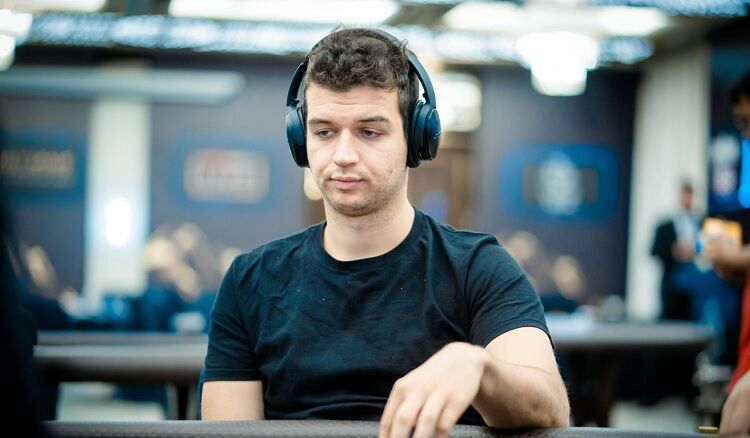
High roller poker tournament end boss Michael Addamo.
Playing Poker Against Michael Addamo
DN: That’s a really smart way to do it, and I think that’s what Michael Addamo was doing quite frankly. Everyone thinks this is GTO poker because everyone’s using the same sizes, but there’s other sizes that can be GTO to. I think Addamo spent a lot of time working with totally different sizes and learning those at a high level, so then when people approach him they don’t know how to deal with it. “Wait a minute, you c-bet 150% pot? Nobody does that!” I think there’s some value in coming up with your own sizes, because if you’re just using the sizes that everybody learns in all the different study programs, you make life a little bit easier for them.
JL: I’ve never talked strategy with Addamo, but what I imagine he’s doing is he is using lots of big size options, but also adjusting what the opponent does against the solver when faced with those big size options. I gotta presume he is saying that you’re an overfold to those big size options, because most people fold whenever you put in the 2x pot turn bet with middle pair.
DN: By the function of the way poker works, the larger the bet the stronger the hand you need to call. If there’s $1,000 in the pot and someone bets a dollar, I’ll call you with a pair of deuces. It’s a dollar right? If you’re getting a thousand to one why not, but if there’s now a $1,000 in the pot and someone bets $50,000, now you can’t just call with like a pair of deuces, that’s suicidal unless you know for certain that that player is bluffing too often. It becomes, again, a little bit of a leveling war. Michael Addamo does a really good job employing different sizes that mess people’s brains up.
JL: I can guarantee whenever you start putting out 2x pot bets on the turn with a lot of money left on the river, people fold too often because they don’t want to face a big river bet.
DN: But then you have some others who are like “screw this guy. I’m sick of these big bets, I’m gonna call!” and then he shows the nuts.
JL: Remember that time you called (Addamo) early in big tournament, and he just showed you the nuts? You had A-K and it was an easy call against him, but he just had the nuts and you lost. Everyone said “why would Negreanu call here?”, but the answer is because he does this stuff all the time.
DN: It was an interesting pot actually. I did the solve, and the play he made on the river was a 22 big blind mistake according to the solver, but he’s smarter than that! He basically bet 3x pot with a hand that he’s never supposed to do that with, but he correctly deduced that I was going to overcall in this spot against him and I wasn’t going to be pushed around. So he just went for it! That’s probably one of the best things I learned from Addamo. Say for example there’s a spot where you know if you bet ⅓ pot, the guy is probably gonna call you, and if you bet 3x spot they’re probably gonna fold. If they do call, once in a while that’s worth risking the one-third.
JL: Keeps them honest.
DN: You can really go for it and (Addamo) did in that spot. He basically doubled up in a spot where no other player would have, because no other player would have bet that size.
JL: Also, maybe he just knows that some people overfold, some people over call, and a guy who’s not playing for the money and who’s trying to win the tournament might be the guy you want to go for full value against, because he’s not going to fold.
DN: That’s where poker gets fun. I’ve historically had an image of being a freaking payoff station, he also knows that and thinks “maybe D-Negs will find the call, I’ll jam it in his face.” It worked, congrats, but I got him the next year! I trapped him good, he tried to bluff me and it was not going to work.
JL: A lot of people would have lost the first one where you hero called with a bluff catcher, and then they would be terrified to call him ever again, but that would be ridiculous. He is going to bluff sometimes if he’s good, and he is good.
DN: If you took your average player and they bet, I wouldn’t have called with A-K, I’m just gonna fold. Not many players have the guts in a $250,000 buy-in tournament to YOLO it in level one. Most people are just going to have it, so I would fold against almost everyone except that gentleman. He’s earned calls against me. It’s funny, after he did that people were like “how could you call Daniel?”, but about an hour later he ran almost the identical same hand, and he bluffed Jake Schindler! This is why I called, he bluffs sometimes!
JL: He probably got called against you, got the fold against Schindler, and then won all the money. Easy game right? I will say though whenever you use a style that puts yourself all-in a lot both with value and with bluffs, you’re gonna have big swings. I think a lot of people see the battling-type players and they think that it is exciting poker. It is exciting, don’t get me wrong, but I’m sure Addamo’s gone on some big upswings and some big downswings, but probably bigger than me because I’m more on the cautious side. I’m not all-in every other hand.
DN: The last time I was in Cabo playing the GG World Series of Poker, Addamo was in a $25,000 with us. They show you on the software if someone is in for their second or third bullet, and very early on it said “Michael Addamo, eight” he was in for eight bullets in an hour! You’re absolutely right, somebody who plays “live by the sword die by the sword” style, it’s not for the faint of heart to say the least.
“I think it’s a deadly combination when you take someone like me, who has 30 years of experience playing this game exploitatively, and then teaching him the theory.”
– Daniel Negreanu
Daniel Negreanu On Fixing Leaks In His Poker Game
JL: We talked about the leak of loaning money earlier. I get a lot of comments on this channel from people that have all sorts of leaks. They struggle with plugging them whether it be poker strategy or partying too much. I’m wondering if you ever had any sort of major leak that could have derailed you as a person or poker player, and how did you fix it?
DN: Season one of WPT, it was a big new thing. Poker is on TV now, and everyone’s like “whoa, this is great!” I thought I would be one of the prominent figures on the show and make some final tables, but I learned one of my leaks and I actually made rules for myself after the fact. We go to these different stops, we’ll go to the bar and have some drinks and fun with people, and before you know it it’s 6 a.m. I’m drunk, I go to sleep and the tournament starts at noon, and I show up. By two o’clock I’m in a spot where a guy bets, and I’m like “if I call and lose, I can go to sleep.” Wasn’t ideal! So I essentially made rules for myself right after that. I realized I sabotaged myself, I didn’t give myself the best opportunity. I wasn’t behaving like a professional.
Night before tournaments, no alcohol whatsoever. No going to dinner with people to tempt myself. Stay in my room, get eight hours of sleep, make sure I’m eating well and that I’m really focused like I’m supposed to be. In season two and three of the WPT I had back-to-back wins, I started to do really well and part of it was just taking it seriously. Sometimes in order for leaks to really scream at you, you have to hit rock bottom to a certain degree. I realized I just blew this whole season, and this was a good opportunity to make a name for myself in poker, and instead I’m just at the bar at six in the morning with a bunch of people.
JL: Would you rather be the champion or at the bar at night time? You kind of get to pick to some extent! I think a lot of people with the same leak will hear that, but they are more recreational players who go play poker to have fun. They go to the World Series, they play a tournament, they want to go hang out with their friends, and next thing you know it’s 6 a.m. They do this once every four or five months and they don’t think it’s that big of a deal, but at the same time it is a big deal and they’re squandering their opportunities. I wonder if they either just don’t care about poker as much as they think they do, or they’re unaware of their leak. I’m always trying to help these people improve their skills, and I think a lot of people just really don’t have their priorities right. You realized your priority was not to hang out and have fun all night, your priorities were to win at poker period.
DN: It’s two words: clear intention. Essentially, before you go to this tournament, what is your intention? Your intention is to go have fun? Cool, then do what you’re doing. If your intention is to do really well in this tournament and focus on doing your best, totally different statement! What behaviors are conducive to me being aligned with my stated intention? If I go to Mississippi and I say I’m going to go there and I’m going to win the WPT, is drinking the night before conducive to that? No. Is booking a flight on day three? No. Is not sleeping? No, all those things are not. What I try to do is make the intention clear, figure out what behaviors will work, stick with those, and I know that if I stick with my behaviors in the long run that it’s gonna work out.
Obviously, sometimes I still don’t win the tournament, I look back and I say “okay, what worked and what didn’t work?” What worked is I went to bed at a reasonable hour and I didn’t party. What didn’t work? Maybe I was distracted, maybe I was on the phone too much, things like that. I will then adjust for the next one and sort of recreate a new kind of intention statement, with a little road map of what specific keys I need to stick to. When it’s over, if you didn’t succeed look back at your checklist, and then you can sort out why. Sometimes it’ll be because you got aces cracked, but if you did all the right things be proud of that. Be proud of the fact that you stuck to your guns, you did what you said, and enjoy the process.
JL: I always recommend poker players get a hobby that is not so results oriented or full of variance like poker is, like going to the gym. Pretty good hobby because you can kind of control the results within reason. Or just living a healthy lifestyle: going to bed on time and eating right when you’re playing poker. These are things you can definitively control, and if you do them right you should be happy, even if poker does not go well because poker’s not gonna go well a lot of the time.
DN: That’s the hard part. For example, I want to lose 20 pounds in the next six months. That’s very easy and it’s very analytically driven because you can say “this is the goal and this is what I will need to do to get there”, and you can follow that road map. If you follow the steps you get there. Obviously you’ll have some side tracked issues, maybe you get sick, but that’s one where you can definitively say I did everything right and I achieved the goal. Poker doesn’t quite work like that, but it doesn’t mean the process doesn’t work. You can do everything right and still lose, which is incredibly frustrating, but all I can do, in my opinion, is focus on my own behaviors, my actions, and my checklist and ask myself “am I doing all the things that I said?” I said going into the World Series, I’m going to watch two hours of poker and I’m going to study. If it’s a bad World Series in terms of results, I’ll look back and see what worked and what didn’t. What more can I add? Is there anything else that I can look at that I can improve upon? Every year I look to improve upon things and I’ve got ideas for this year, even in terms of subtle things.
JL: Always improving, that’s how you stay at the top I suppose. Don’t be satisfied with your current situation, always try to do better.
DN: People ask me: how would I do against the version of myself in 2004? In 2004 I won everything, I won WPT Player of the Year, World Series Player of the Year, I won $4.4 million in tournaments and the biggest event was a $10K, I was crushing it! But having said that, back then my edge against the field was drastic, I was much better than everybody else. Today I’m not. Today I’m amongst the best, but there are plenty of players better and I don’t have as big of an edge. However, the me now would absolutely destroy the old me. The old me in today’s climate in high stakes poker games has no chance to win. That’s hard for people to understand in terms of how the game’s evolved and how you have to keep evolving with it.
JL: Is that not kind of a negative towards the future of high stakes poker then? If you are now just as good as every other good player, there’s essentially no edge right?
DN: There is an edge, because in these fields you’re gonna have some players that are not professional. Let’s say, for example, you had a field of 40 players: 35 pros and five bad players that are definitely losers. Those five players will lose money, the top 10 pros will maybe win, and now you leave about 20 to 25 guys who will all make money to different varying degrees. Now, this falls apart when you don’t have those five.
JL: That’s the fear, what happens when those five lose their money or lose their interest?
DN: Well, I look at the Triton and there’s a $25k going on in Cyprus with 150 players. There’s actually more interest from a wider group of people who want to get involved in high stakes poker, so as of right now poker’s hot, but there will be ebbs and flows in that. Generally speaking people don’t enjoy losing, so if you lose consistently over and over and over without any sort of wins or winning moments, it can turn you on the game.
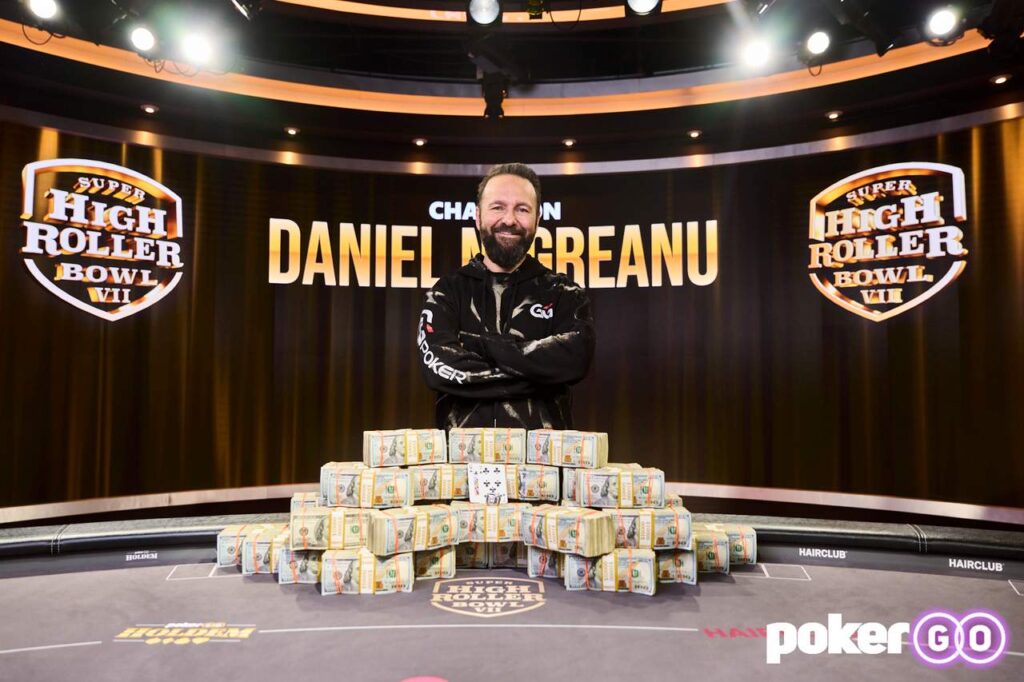
Negreanu after winning Super High Roller Bowl VII (Photo courtesy of PokerGO).
Interview Speed Round With Daniel Negreanu
JL: I’m inspired by Rob Yong’s speed round the other day he did with Jason Koon, let’s do a speed round! Answer these questions quickly if you do not mind.
DN: *Thumbs Up*
JL: What means more to you today: World Series poker bracelets, World Series of Poker Player of the Year, or profit?
DN: World Series of Poker Player of the Year
JL: Has anyone won it three times yet?
DN: I sort of did, but then they took it from me.
JL: Oh well, you got to try again I guess! How many people do you think will be will be in the 2023 Main Event?
DN: I don’t remember what the all-time record was, but 200 more than the all-time record.
JL: That’s confidence, you really do think poker is hot huh?
DN: I do!
JL: Who is a player that we may not know who we should make sure to follow this summer?
DN: Let’s go with Jesse Lonis, good young player!
JL: When you go to the World Series, what is your favorite snack food to eat during the day? Where can we buy it? I know it’s not in regular stores.
DN: It’s definitely going to be chocolate, various forms of chocolate. Put it in my veins let’s go!
JL: What is your favorite poker game to play?
DN: Stud 8 or better, but I prefer playing a full mix of games like Dealer’s Choice.
JL: In a Dealer’s Choice game, what’s your least favorite game to play?
DN: I can’t tell you because everybody will call it!
JL: Well tell me who would always call it! Who’s the toughest mixed game opponent you will play against?
DN: I would say in Dealer’s Choice, Adam Friedman is very adept at playing all the games well and figuring out what you don’t, and calling that.
JL: Who’s been your toughest No-Limit opponent recently?
DN: That’s a tough one, Alex Foxen is definitely up there.
JL: Foxen likes to make you put money in the pot.
DN: Foxen is intense for sure.
JL: He used to be a little bit too insane, but I think he’s gotten a little bit more tight-aggressive and that’s made him substantially better. He’s not drastically over bluffing now.
DN: I just think he’s overall good period. I like his style and I like his approach. I play very differently than he does, but I admire it from afar.
JL: What is your favorite hand to stack people with?
DN: It’s got to be 6-4 suited.
JL: All right, nice one. They never see it coming! Right now, who is your favorite person to watch play televised poker?
DN: Phil Hellmuth by a mile. I sit there with popcorn, just hoping somebody actually beats him and then watch the rant unfold, it’s hilarious!
JL: I don’t think a lot of people necessarily know that Phil’s rants are not malicious.
DN: A lot of people internally vent and they say a lot of things in their brain, but Phil just says it out loud. He’s got no filter.
JL: In a hypothetical No-Limit event, would you rather never be allowed to raise postflop, or have to use Allen Kessler’s pre-flop strategy on every hand throughout the tournament?
DN: I don’t raise postflop anyway, so that’s my style. But I don’t want to play Allen Kessler style.
JL: We heard it here first, you’re the next Allen Kessler. In five words or less, what makes poker such a great game?
DN: Level. Fair. Competition for all.
JL: Thank you very much for coming on, I appreciate it! What do you want all the people here to go check out to learn more about you, or the things that you are involved with?
DN: I’ll tell you what, once the World Series of Poker starts you can check out my channel on YouTube. I do daily World Series of Poker vlogs, so subscribe and you’ll get one every morning throughout the entire series.
JL: How much effort does it take to make that? It’s actually insane, especially given you’re playing poker all day!
DN: Good news is I obviously don’t do any of the editing. The way we set it up is I have a vlog phone which is essentially just an iPhone. It goes to an iCloud, and all the clips that I shoot go into the vlog. I don’t have them edit anything, I don’t shoot eight minutes of something, I shoot 30 seconds and that’s what goes in. I have my guy Christian set it up with the music, we have a team in Korea who spruces it up overnight, and when I wake up in the morning it’s already done.
JL: You got it figured out! All right, make sure you check out Daniel’s YouTube channel. I have some of your action this summer so let’s hope you win. If you lose that’s okay too, I wish you the best of luck. Thank you for being such an amazing ambassador for poker, and good luck at the series!
DN: All right bud, appreciate it. Good luck to you too, thank you!
